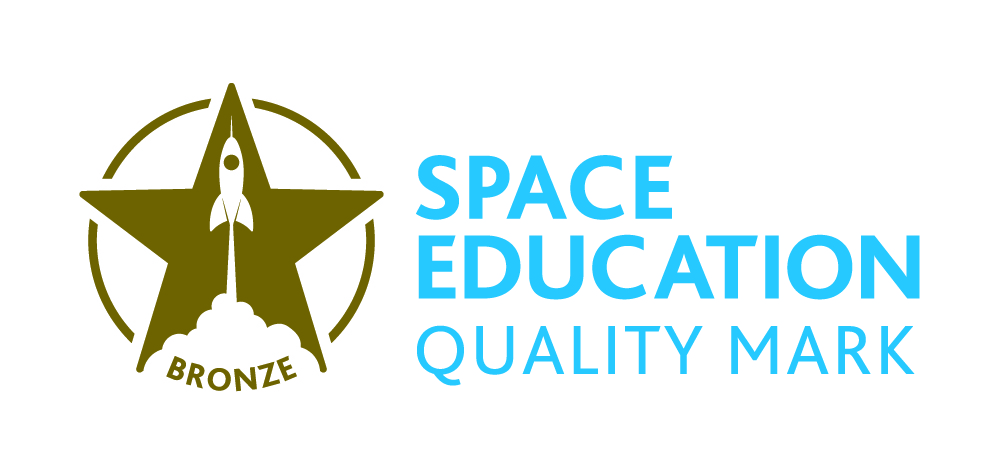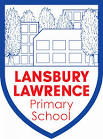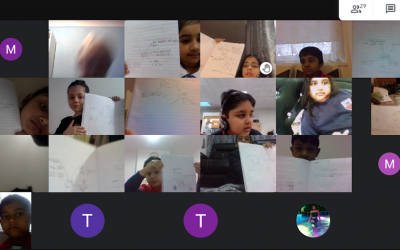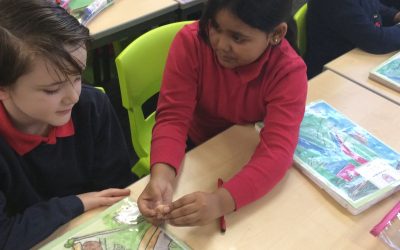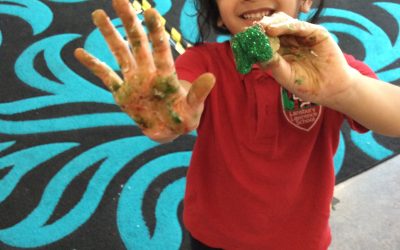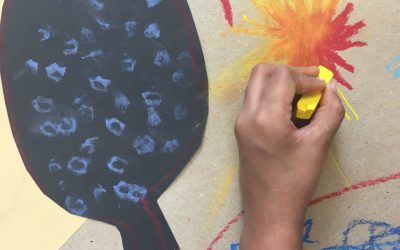Remember to look up at the stars and not down at your feet.
A high-quality science education provides the foundations for understanding the world through the specific disciplines of biology, chemistry and physics. Science has changed our lives and is vital to the world’s future prosperity, and all pupils should be taught essential aspects of the knowledge, methods, processes and uses of science. Through building up a body of key foundational knowledge and concepts, pupils should be encouraged to recognise the power of rational explanation and develop a sense of excitement and curiosity about natural phenomena. They should be encouraged to understand how science can be used to explain what is occurring, predict how things will behave, and analyse causes. National Curriculum for Science, purpose of study
Science Week in Hamilton Class
We conducted two glitter experiments to better understand germs. First we filled a tray with milk and added germs (glitter) and watched what happened when we added soap. Then put germs (glitter) onto our hands with hand cream and saw how the germs spread when we touch...
Puzzle Hunt for International Women’s Day!
In Year 4 we celebrated International Women's Day with a fun hunt for puzzle pieces in the playground. Each puzzle piece had interesting information about some very inspiring women in the Science Industry. We split up into three teams and searched the playground and...
Innovate that Problem! (British Science Week)
This week is British Science Week with a focus on inspiring our young people to become innovative. To start with, we noticed a problem: some of our equipment was loose in our trays. Maybe pencil cases are just too much of a faff? The problem! So we decided to solve...
Hokusai Class’ Exhibition
Hokusai have thoroughly enjoyed learning all about the human body this half term and answering the question: "How do our bodies work so effectively?" The learning culminated in independent projects where the children created models, posters, videos and leaflets to...
Hepworth Class Exhibition
What a strange start to the year it's been but Hepworth Class have been working so hard and facing the challenge every day! Our topic this term was "Healthy Human Body" the children got a chance to explore and research their own project. We also wrote our own class...
Rock-solid evidence!
Students in Hokusai class were fascinated to find out how fossils were formed and to discover just how much they could learn from the artefacts they were examining. The class used observation and enquiry to dig deeper into the lesson, and they look forward to making...
Testing Materials
Today, Year 3 tested different materials to decide which would make the best sunglasses. We tested black paper, foil, clear plastic and coloured plastic. We tested them by putting them in front of our eyes and seeing how much light pass through. If too much light...
A light experiment!
Year 3 had an exciting science lesson this week with an introduction to learning about light and dark. First, we got our brains in gear by thinking about what we already knew about light and dark and also some questions that we'd like to have answered over the half...
Busy Bees.
We have been very busy recently. Not only have we been on a trip to Tower Bridge but we also had STEAM day and World Book Day! Phew! First we had world book day. Some of our teachers put on a funny play of Fantastic Mr Fox by Roald Dahl which we thought was hilarious....
STEAM Day 2020
What is STEAM? STEAM stands for Science, Technology, Engineering, Arts and Maths. At Lansbury Lawrence, we have a special celebration of the subjects once a year during British Science Week, called STEAM Day. STEAM Day is very special because children have the...
